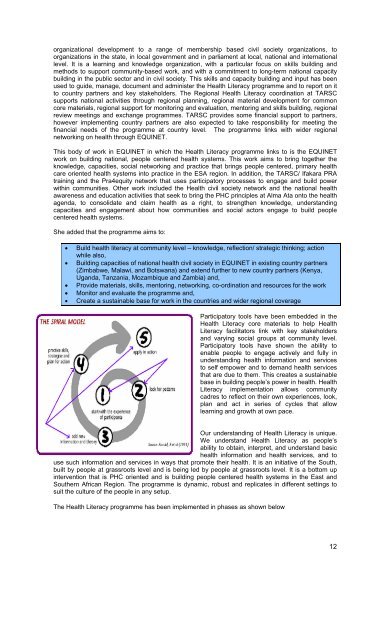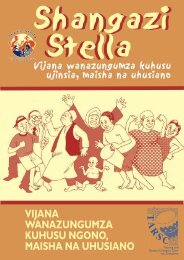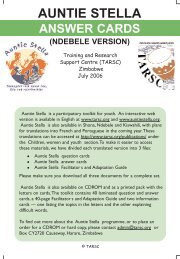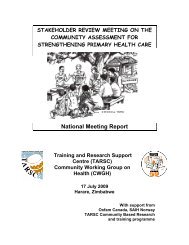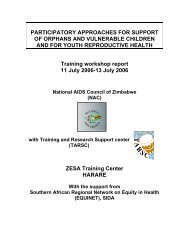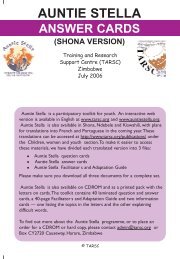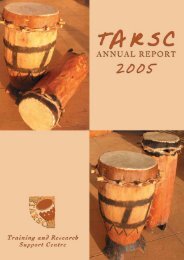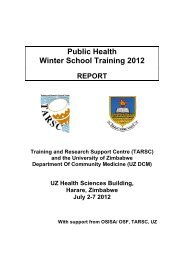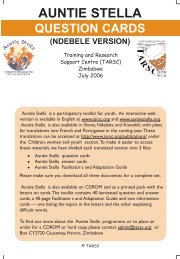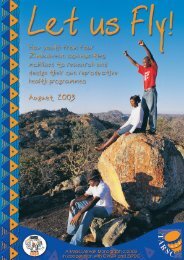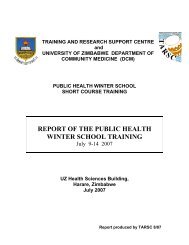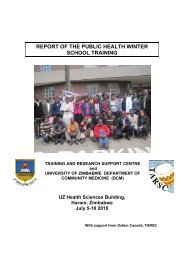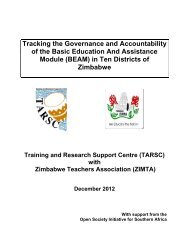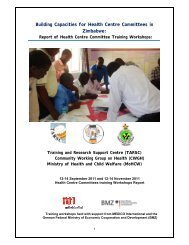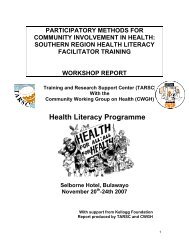HLregional meeting09.pdf - Training and Research Support Centre
HLregional meeting09.pdf - Training and Research Support Centre
HLregional meeting09.pdf - Training and Research Support Centre
You also want an ePaper? Increase the reach of your titles
YUMPU automatically turns print PDFs into web optimized ePapers that Google loves.
organizational development to a range of membership based civil society organizations, to<br />
organizations in the state, in local government <strong>and</strong> in parliament at local, national <strong>and</strong> international<br />
level. It is a learning <strong>and</strong> knowledge organization, with a particular focus on skills building <strong>and</strong><br />
methods to support community-based work, <strong>and</strong> with a commitment to long-term national capacity<br />
building in the public sector <strong>and</strong> in civil society. This skills <strong>and</strong> capacity building <strong>and</strong> input has been<br />
used to guide, manage, document <strong>and</strong> administer the Health Literacy programme <strong>and</strong> to report on it<br />
to country partners <strong>and</strong> key stakeholders. The Regional Health Literacy coordination at TARSC<br />
supports national activities through regional planning, regional material development for common<br />
core materials, regional support for monitoring <strong>and</strong> evaluation, mentoring <strong>and</strong> skills building, regional<br />
review meetings <strong>and</strong> exchange programmes. TARSC provides some financial support to partners,<br />
however implementing country partners are also expected to take responsibility for meeting the<br />
financial needs of the programme at country level. The programme links with wider regional<br />
networking on health through EQUINET.<br />
This body of work in EQUINET in which the Health Literacy programme links to is the EQUINET<br />
work on building national, people centered health systems. This work aims to bring together the<br />
knowledge, capacities, social networking <strong>and</strong> practice that brings people centered, primary health<br />
care oriented health systems into practice in the ESA region. In addition, the TARSC/ Ifakara PRA<br />
training <strong>and</strong> the Pra4equity network that uses participatory processes to engage <strong>and</strong> build power<br />
within communities. Other work included the Health civil society network <strong>and</strong> the national health<br />
awareness <strong>and</strong> education activities that seek to bring the PHC principles at Alma Ata onto the health<br />
agenda, to consolidate <strong>and</strong> claim health as a right, to strengthen knowledge, underst<strong>and</strong>ing<br />
capacities <strong>and</strong> engagement about how communities <strong>and</strong> social actors engage to build people<br />
centered health systems.<br />
She added that the programme aims to:<br />
• Build health literacy at community level – knowledge, reflection/ strategic thinking; action<br />
while also,<br />
• Building capacities of national health civil society in EQUINET in existing country partners<br />
(Zimbabwe, Malawi, <strong>and</strong> Botswana) <strong>and</strong> extend further to new country partners (Kenya,<br />
Ug<strong>and</strong>a, Tanzania, Mozambique <strong>and</strong> Zambia) <strong>and</strong>,<br />
• Provide materials, skills, mentoring, networking, co-ordination <strong>and</strong> resources for the work<br />
• Monitor <strong>and</strong> evaluate the programme <strong>and</strong>,<br />
• Create a sustainable base for work in the countries <strong>and</strong> wider regional coverage<br />
Participatory tools have been embedded in the<br />
Health Literacy core materials to help Health<br />
Literacy facilitators link with key stakeholders<br />
<strong>and</strong> varying social groups at community level.<br />
Participatory tools have shown the ability to<br />
enable people to engage actively <strong>and</strong> fully in<br />
underst<strong>and</strong>ing health information <strong>and</strong> services<br />
to self empower <strong>and</strong> to dem<strong>and</strong> health services<br />
that are due to them. This creates a sustainable<br />
base in building people’s power in health. Health<br />
Literacy implementation allows community<br />
cadres to reflect on their own experiences, look,<br />
plan <strong>and</strong> act in series of cycles that allow<br />
learning <strong>and</strong> growth at own pace.<br />
Our underst<strong>and</strong>ing of Health Literacy is unique.<br />
We underst<strong>and</strong> Health Literacy as people’s<br />
ability to obtain, interpret, <strong>and</strong> underst<strong>and</strong> basic<br />
health information <strong>and</strong> health services, <strong>and</strong> to<br />
use such information <strong>and</strong> services in ways that promote their health. It is an initiative of the South,<br />
built by people at grassroots level <strong>and</strong> is being led by people at grassroots level. It is a bottom up<br />
intervention that is PHC oriented <strong>and</strong> is building people centered health systems in the East <strong>and</strong><br />
Southern African Region. The programme is dynamic, robust <strong>and</strong> replicates in different settings to<br />
suit the culture of the people in any setup.<br />
The Health Literacy programme has been implemented in phases as shown below<br />
12


